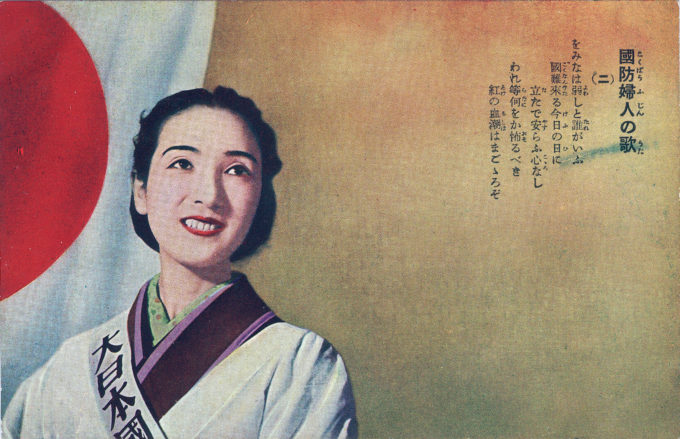
“Song of the National Defense Woman” [Kokubou-fujin no uta], c. 1940. The Greater Japan National Women’s Defense Association was a patriotic organization created in 1932 to assist soldiers on the Manchurian front, help families of war dead, and care for the wounded.
“The Patriotic Women’s Association had been formed in 1901 as a relatively élite organisation of women with links to the bureaucracy, the military and the navy. In 1932, a new organisation was formed with its base in the petit-bourgeois class of shopkeepers and small businesses … The Greater Japan National Defence Women’s Association (Dai Nihon Kokubou Fujin Kai) developed from the Osaka Women’s Defence Association, born in the regional city of Osaka in March 1932.
“The association built on a swelling popular response to the Manchurian Incident, reflected in the production of care packages (imonbukuro) to send to soldiers at the front, and the collection of monetary donations to support the war effort. Such activities provide evidence of the ways in the which the consciousness of national mobilisation gradually penetrated the lives of Japanese women and men at the everyday level.
“… Photographs from the 1930s and 1940s show the women of the Patriotic Women’s Association and the National Defence Women’s Association in kimono and white sashes bearing the name of the association to which they belonged. The aprons were the dress of women who worked in their own kitchens rather than employing domestic servants.
“The National Women’s Defence Association transformed the aprons from kitchenwear into garments which could be worn in public, masking class difference between women by hiding the quality of the clothes underneath … By wearing aprons outside the home they metaphorically took the kitchen with them, thus defusing the anxieties caused by women in public space.”
– Feminism in Modern Japan: Citizenship, Embodiment and Sexuality, by Vera Mackie, 2003

